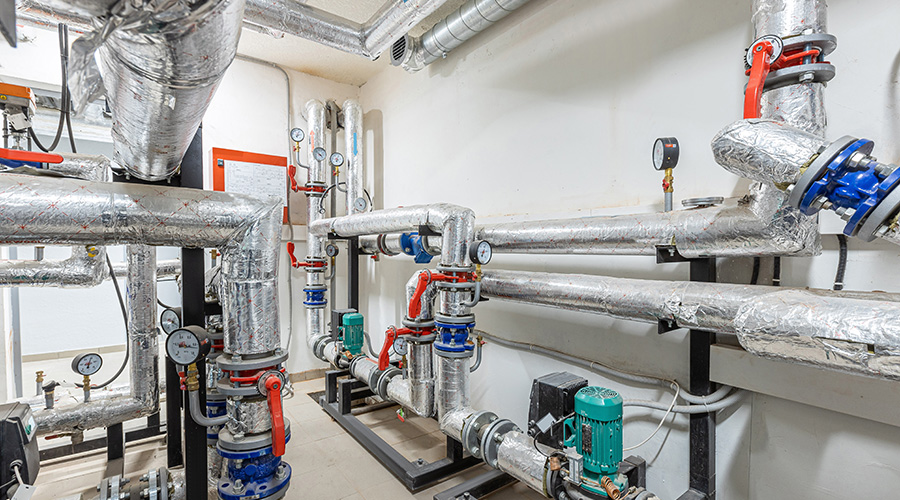A New Era for HVAC Equipment
Manufacturers expand training and service offerings, forcing managers to rethink maintenance staffing issues
Manufacturers of HVAC equipment for decades have tried to “go beyond the sale” by offering more than just products. But in recent years as the slowing economy has put a squeeze on sales of equipment and systems, manufacturers have tried to generate revenue by putting more focus on such offerings as service contracts and technician training. So as the sales environment changes, the challenge for managers is determining how these expanded offerings might help them address their departments’ needs.
Departmental Factors
Several forces are at work in the shifting relationship between maintenance and engineering managers and manufacturers of HVAC equipment.
First, many managers are struggling to hire and retain qualified front-line technicians, in large part because high schools and vocational schools aren’t turning out enough graduates with the needed skills. As a result, a manager buying a new chiller or air-handling unit might be more inclined to supplement an already-thin maintenance staff by signing a service contract with the manufacturer.
Mike Menzel, director of maintenance at Barnes-Jewish Hospital in St. Louis, cites a “lack of time and in-house expertise“ as leading reasons his department turns to vendors for equipment service. The department most often enters into such agreements for re-commissioning of existing units and building automation system (BAS) service, Menzel says.
Second, technology advances in all types of HVAC equipment and control systems have raised the bar for technician skills. And these advances goes beyond the big-ticket equipment. Even the diagnostic tools used to monitor and troubleshoot the systems are more technologically advanced than ever.
So, to protect the organization’s investment in high-tech equipment, a manager might opt to have the manufacturer — who presumably knows the technology or system best — monitor, inspect, test and repair it.
“Chillers require enough specific knowledge, training and tools and are important enough pieces of equipment that we put them on service contracts,” says Rich Hertlein, manager of engineering and maintenance at Bethesda North Hospital, a 400-bed facility in Cincinnati. “Depending on the chiller, we may have a (preventive maintenance) only contract or a full-service contract. All of the contracts include basic PM and predictive procedures, like oil analysis.”
Training Matters
The same issues come into play when making decisions on vendor-provided training. Many maintenance and engineering department make effective use of in-house expertise and third-party providers for technician training. But vendors have expanded their training offerings, and these services can deliver a number of benefits to departments, managers and technicians.
Among the benefits is the fact that the manufacturer knows the equipment best and, as a result, is in the best position to clearly explain and demonstrate its workings. Also, vendor-provided training creates a good opportunity for equipment makers to work directly and exchange ideas with front-line technicians.
“We tend to get a better product because (manufacturers) build relationships with the guys that maintain the units,” Menzel says. “And the bugs are identified and worked out better.”
Whenever Bethesda North Hospital expands or renovates, Hertlein says he makes certain the BAS expands and that the system’s service contract reflects the additional maintenance training needs.
“Each contract is written with in-service, or training, hours that help us train additional staff on the system,” he says. “The contract includes some training hours that we can use for actual class time.
“Or we can use it as ‘field training,’ where we work with the controls manufacturer’s tech to make changes and tweaks to the system while our guys watch and learn. We find that the controls vendor appreciates the fact that we have a knowledgeable staff.”
The hospital also has a service contract for its water-treatment program. But this contract goes beyond the others the hospital has entered into.
“This is an example of a more collaborative arrangement, where the treatment company comes in a couple of times per month and checks on the various hot-water, heating, steam, and chilled-water systems,” Hertlein says. “The in-house staff is responsible for the daily checks of the water chemistry, chemical feed rates, etc.
“This is another example of the contractor educating our in-house staff to mutual benefits.”
Making the Decision
Managers need to proceed carefully in making decisions on services contracts and vendor-provided training. Unless considered fully, such investments can tie up organizational resources in contracts that don’t deliver what the department and technicians need. Manufacturers eager to expand the relationship with a customer might end up simply putting a manager in a delicate spot.
“We do tend to favor contractors who have the expertise to give us creative ideas and engineering services,” Hertlein says. “But you have to be careful not to let them expect that their help will circumvent the bidding process.
“We have fairly well-defined rules as to when we can award a contract to a single bidder and when we need multiple bids. The requirement to get multiple bids generally is related to the size of the contract.”
Ultimately, managers’ will have to base their decisions on HVAC equipment, training and service contracts primarily on current needs. But it also will be important to balance short-term needs with long-term considerations related to the ever-changing relationship between manufacturers and managers.
Related Topics:











